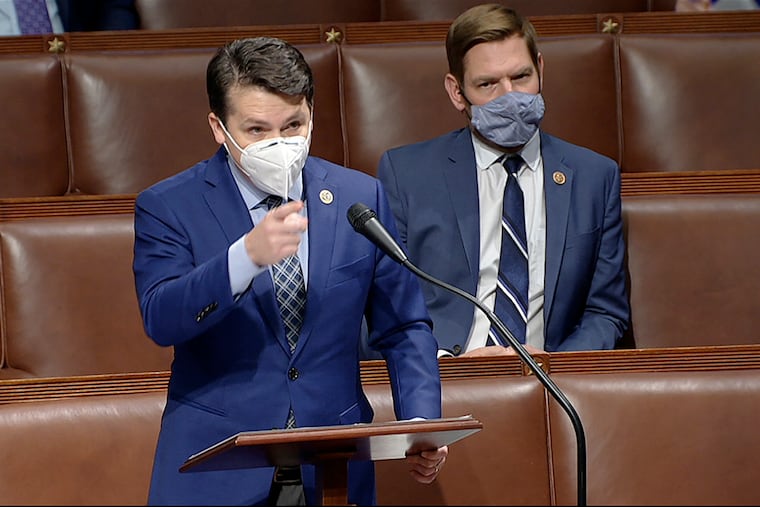Legislation inspired by Inquirer would help immigrants, but citizenship process needs bigger overhaul | Opinion
After Inquirer op-ed, Rep. Brendan Boyle introduces a bill to change immigration law that penalizes alcohol and drug use.

“Have you EVER been a habitual drunkard?”
That archaic and irrelevant question is one that every person who applies to U.S. citizenship must answer — for now.
But if new legislation from Rep. Brendan Boyle passes, it could be stricken from the forms forever. On Monday, Boyle, a Democrat from Philadelphia, introduced legislation to remove that question and exempt marijuana-related offenses from being considered in the “moral character” section of citizenship applications. In a news release Boyle said: “These questions are wholly unrelated to citizenship, and only serve to reinforce societal stigmas connected to alcohol and substance abuse. It is extremely troubling to see federal applications like this that continue to use a harsh and antiquated term such as ‘habitual drunkard.’ ”
» READ MORE: ‘Habitual drunkenness’ is not a reason to deny someone like me U.S. citizenship | Opinion
I am an immigrant from Israel and currently applying for citizenship. In December, I wrote in The Inquirer about the “habitual drunkard” question, its McCarthyist origin, how it can play out in deportation, and why it should be removed from applications. I asked: “Why is the fear of ‘habitual drunkards’ and ‘drug abusers or addicts’ a yardstick for immigration outcomes, particularly in an era when platitudes such as ‘addiction is a disease’ purportedly recognize that these people aren’t moral failures?”
A step in the right direction
It is heartening to see a member of Congress not only grapple with that question, but conclude that the yardstick is not legitimate. Rep. Boyle’s bill is an important step in the right direction — and the latest in efforts to change the tenor of U.S. Immigration law, from an exclusionary threatening voice attempting to scare off immigrants to a more welcoming one that approaches immigrants with respect.
In February, Boyle introduced an amendment to require that new citizens receive voter registration forms at naturalization ceremonies, a step to help immigrants use the civic and political power that comes with citizenship.
Additionally, President Joe Biden’s immigration bill replaces the word “alien” with “noncitizen” in immigration law. Joaquin Castro, Democrat from Texas, introduced legislation to enact this change in 2019.
There is a growing recognition, across issues, that language matters. Research from the field of addiction demonstrated that terms like “addict” elicit negative attitudes toward people in addiction. In other words, stigmatizing words evoke stigma. Similarly, referring to people as “alien” or “illegal” is dehumanizing and can shape negative public perception about immigration. Both removal of “alien” and “habitual drunkard” won’t undo the harms of the past, but they symbolize a path for a less prejudice immigration system.
» READ MORE: Biden administration is undoing Trump’s legacy of hate, one word at a time | The Angry Grammarian
Undoing Trump’s damage
Yet the work to fix America’s broken immigration system goes far beyond word choices.
Donald Trump made immigration a key issue in rhetoric and policy during his presidency to inflame racist politics. His family separation “zero tolerance” policy for the U.S.-Mexico border was the most egregious example but far from the only one. Trump attempted (and thankfully failed) to repeal DACA, gutted the asylum system, and slashed the number of refugees admitted to the country. The administration ramped up deportations through ICE while slowing down visa and naturalization processing through United States Citizenship and Immigration Services (USCIS). Trump was explicit in his race-based immigration preferences, wanting immigrants from countries “like Norway” and not “shithole countries’' like Haiti, El Salvador, or African nations.
In the last few weeks of Trump’s term, the administration increased the length and difficulty of the civic exam immigrants need to pass to become citizens — a notoriously challenging test that most Americans wouldn’t have been able to pass. The Trump administration citizenship also attempted to increase the naturalization application fee from $776 to $1,160 but a judge halted the change. The civics test was already burdensome, expensive, and according to USCIS, is the most “worrisome” step in naturalization. Trump found a way to make it even worse.
What’s next
A month into his presidency, Joe Biden scrapped the change to the test. Until April 19, USCIS will offer both versions of the test. After that, the exam will return to its previous form, another good step toward welcoming immigrants to America.
» READ MORE: For 11 million undocumented people, including 50,000 in Philly, Biden offers a chance to step from the shadows
But Biden and Congress should go further still.
The civics test was added to the naturalization process in the same 1952 law that introduced the “habitual drunkard” question as a part of the effort to restrict immigration — particularly, at the time, targeting Jews post-Holocaust and members of Eastern European communist countries. Heba Gowayed, an assistant professor of sociology at Boston University, has persuasively made the case that the test should be abolished: “[The civics test] is an ineffective tool for relaying information on rights and history that immigrants need and it is a discriminatory requirement, particularly hard to fulfill for immigrants at the margins.”
America’s immigration system is full of discriminatory, archaic, and at times arbitrary ideas of morality. That foundation needs to change. Even if Boyle’s legislation passes, people with a history of drug use or addiction could be denied by immigration in other parts of the process. But by getting rid of the “habitual drunkard” question, and enacting other measures in Biden’s bill, America’s immigration system could start becoming something it never was for most immigrants: welcoming.